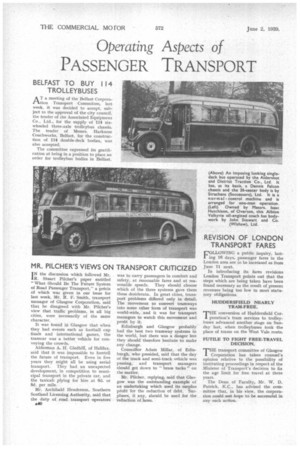MR. PILCHER'S VIEWS ON TRANSPORT CRITICIZED
Page 50

If you've noticed an error in this article please click here to report it so we can fix it.
I N the discussion which followed Mr. R. Stuart Pilcher's paper entitled " What Should Be The Future System of Road Passenger Transport," a precis of which was given in our issue for last week, Mr. R. F. Smith, transport manager of Glasgow Corporation, said that he disagreed with Mr. Pilcher's view that traffic problems, in all big cities, were necessarily of the same character.
It was found in Glasgow that when they had events such as football cup • finals and international games, the tramcar was a better vehicle for conveying the crowds.
Alderman A. H. Gledhill, of Halifax, said that it was impossible to foretell the future of transport. Even in five years they might all be using aerial transport. They had an unexpected development, in competition to municipal transport in the private car, and the taxicab plying for hire at 6d. or 8d. per mile.
Mr. Archibald Henderson, Southern Scotland Licensing Authority, said that the duty of road transport operators *40 was to carry passengers in comfort and safety, at reasonable fares and at reasonable speeds. They should choose which of the three systems gave them these desiderata. In great cities, transport problems differed only in detail. The movement to convert tramways into some other form of transport was world-wide, and it was for transport managers to watch this movement and profit by it.
Edinburgh and Glasgow probably had the best two tramway systems in the world, but there was a danger lest they should therefore hesitate to make any change.
Councillor Adam Millar, of Edinburgh, who presided, said that the day of the track and semi-track vehicle was passing, and transport managers should get down to "brass tacks" on the matter.
Mr. 'Metier, replying, said that Glasgow was the outstanding example of an undertaking which used its surplus profit for the reduction of debt. Surpluses, if any, should be used for the reduction of fares.












































































